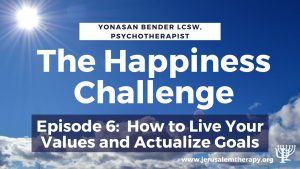“I’m stupid for feeling this way,” was becoming Yaakov’s personal slogan. No one in his family had gotten sick with Corona, he and his wife were fortunate to have jobs they could work from home at, and their grandparents lived down the street making child care a snap. His growing depression took a nose dive after calculating not paying for public transit, day care, and his not-so-occasional falafel lunch break was saving him over 2,000 shekels a month. Critical self-judgement and depression never go together well.
For most of us, this sounds like a dream come true. Who wouldn’t want to work from home and have an extra 2,000 shekels? Yet, this exact story is playing itself out for thousands of Israelis. Why would this dream scenario be a living nightmare? They key is in understanding how depression works.
Depression means a lot of things and has even more causes but “being sad” is not one of them. Some folks are biologically predisposed to depression but often it’s more akin to a type of social contagion. Neuroscientists have found the chemical serotonin, which is connected to depression, is a key component in the social tracking system in our brains. Whenever there’s the slightest change in schedule, surroundings, or life circumstances this system tracks those changes to help you understand where you fall in the social pecking order regulating social anxiety and what constitutes success in each situation.
This research explains several counterintuitive findings. Going on vacation, getting married, and even receiving a promotion triggers depression and no one would say these are “sad” like a death in the family or losing your job. When depression hits it’s this serotonin system is being thrown into a tail spin because the social environment it was monitoring – work, homelife, kids at school – have vanished. It doesn’t care if the change is good or bad. All it cares about is maintaining normalcy and tracking the rules of the social game, whatever that means.
Here’s where therapy comes in as an extremely effective way of jump starting this stalling serotonin system getting you back on track reconstructing a rewarding and stable life rhythm is key.
———-
Yonasan Bender, LCSW, graduated from Hebrew University’s School of Social Work. He works with adults, couples, and children in his private therapy practice in Jerusalem. To share your thoughts, experiences, questions, or a different perspective, you can reach Yonasan Bender LCSW at 053-808-0435 and at info@jerusalemtherapy.org. Learn more about Yonasan and his work at www.jerusalemtherapy.org.




